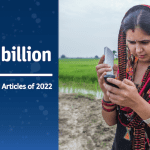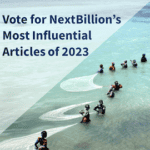What was the Most Influential NextBillion Post of 2017? Vote for Your Favorite
“Fast away the old year passes.”
That lyric from “Deck the Halls” always hits home this time of year – and in 2017, it resonates particularly strongly. Across the social sectors, the year often felt like a race against time – or perhaps against competing societal forces that had been unleashed or emboldened, threatening to undermine much of the hard-won impact these sectors have made. This renewed sense of urgency is reflected in NextBillion’s most influential posts, which are selected from our most read and discussed content of the year.
That urgency wasn’t just about asking questions – posts that do well on NextBillion almost always ask tough ones. But implicit in many of 2017’s top posts was not merely a challenge to the status quo, but a defense of what we know, what we value and the progress that’s been made. Chalk it up to the tumultuous times in which we live, where nothing can be taken for granted as “certain,” but it felt to this editor that contributors were especially eager to get their ideas into circulation, and were just as eager to defend them.
And so here we present the most influential posts from the last twelve months, one per month, in what is now our sixth annual holiday contest. We encourage you read every post and then to cast your ballot, early and often. You may vote as many as a 12 times, and you can do so by scrolling to the voting app at the bottom of this page. Please share this list widely, and we’ll look forward to connecting with you again in the new year, which we hope will be as engaging and envelope-pushing as this one (if perhaps a bit less stressful).
The voting ends at 12 p.m. Eastern Standard Time (U.S.) on Jan. 2, and winners will be announced on Jan. 3.
January
Yes, Microcredit Requires Subsidies … and That’s Great News
Timothy Ogden, managing director of the Financial Access Initiative at NYU-Wagner, pointed to a study – which might be unwelcome to some – that he also happened to co-author. That study highlighted the fact that a mere 20 percent of MFIs show an actual profit, while the other 80 percent could not maintain operations without the aid of social investors providing below market-rate capital. But even though the study aims to bury the notion that microfinance can prosper without subsidies, it’s not all gloom and doom, Ogden writes.
February
Why the Crusade Against Cash Isn’t Clearly ‘Pro-Poor’
Phil Mader, a research fellow at the Institute of Development Studies in Brighton, pushed back on the global war on cash to cry foul – not only on the rapidly changing financial system, but on the motivations of those institutions charging ahead to purge cash from it. The key arguments in favor of digital financial inclusion are its relatively cheap costs, higher transparency and lower susceptibility to corruption. But as Mader contends, the question of how the poor will truly benefit is far more ambivalent.
March
An Impact Investor Urges Caution on the ‘Energy Access Hype Cycle’
Ceniarth, an impact investment group, had been fairly active in the energy access sector for at least three years. But in 2017, the three principals with the firm – Greg Neichin, Diane Isenberg and Mary Roach (now at Loowatt), explained why they were stepping back from off-grid energy venture capital investments in emerging markets. Their concerns about the solar home system sector touched off the longest-running debate this year on NextBillion, as several sector investors echoed their concerns, while others, including some entrepreneurs, rebutted them.
April
In Impact Investing’s Rush to the Mainstream, Who Are We Leaving Behind?
In a year marked by runaway momentum in impact investing, Mara Bolis of Oxfam took to NextBillion’s pages to argue for a reassessment of priorities in the sector: One that begins with placing the needs of social businesses first – and the profits of investors second. In highlighting a new report by Oxfam and Sumerian Partners, Bolis noted that financial returns are great, but “let’s not pretend that investors seeking a pure market return can tackle the most complex global challenges in high-risk markets.”
May
The discussion sparked by the Ceniarth principals in the above post took another turn a few months later with this piece by Pepukaye Bardouille and Daniel Shepherd with the IFC, and Gianmaria Vanzulli with World Bank Group. The authors calculate that solar home, pay-as-you-go businesses have attracted more than US $250 million – a number that’s likely to grow if these business models can evolve, particularly in the areas of consumer financing, operational efficiency and growth rates. The trio made the case for a nuanced approach to nurturing this emerging industry.
June
If each and every one of the approximately 500 million farmers who feed about 2 billion people received a mobile phone tomorrow, it might not improve their lives. For many who have to navigate spotty networks, unreliable apps and various levels of financial literacy, a mobile phone can be more burden than blessing. Alexandra Fiorillo, the founder and principal at GRID Impact, explained why financial inclusion projects need to avoid pushing technology for its own sake.
July
Can Digital Credit Outperform Microcredit in the Developing World?
Alexandra Wall, Natasha Beale and Carson Christiano, of the Center for Effective Global Action (CEGA) at the University of California, Berkeley also consider the limits of mobile technology – specifically digital credit, a burgeoning business that presents its own set of risks to borrowers. They explore the mission behind CEGA’s newly launched Digital Credit Observatory, which will generate a portfolio of randomized evaluations and a handful of pilot studies to find out whether and how digital credit is “alleviating – or entrenching – poverty in emerging markets.”
August
The UBI Debate: What We Know – and Don’t Know – About Universal Basic Income
Artificial intelligence and machine learning have moved beyond sci-fi and taken several accelerating steps toward becoming reality, one that could eliminate millions of lower-skilled jobs. The rise of the machines spurred another big year of debate around Universal Basic Income. Alison Fahey a senior policy manager at J-PAL, pointed out that, at least based on the evidence we have so far, cash transfers to poor people do not discourage work or increase purchases of vices like alcohol – a key argument of UBI detractors. But Fahey also took a clear-eyed look at what UBI can’t do when it comes to the public good.
September
Beyond ‘Send Money Home’: The Complex Gender Dynamics Behind Mobile Money Usage
M-Pesa’s storied “send money home” marketing effort successfully sold the mobile money platform based on a clear gendered storyline: Men – in this case probably well-educated, young, urban and employed – could use it to send funds to their rurally based mothers. But research from Susan Johnson, a senior lecturer at the Centre for Development Studies at the University of Bath, reveals a far more complex network behind mobile money transactions – one driven by culture, gender relations and family dynamics.
October
There’s No App to Fix Farming – A Lifelong Smallholder Shares What Social Business is Getting Wrong
Gaita Kariuki, CEO of Kenya-based fresh produce startup Selina Wamucii is a farmer and businessman who has spent most of his life in smallholder farming. So he’s well-positioned to comment on what he views as skewed perceptions around technology and social enterprise in the ag space. He took issue with many of the sector’s most talked-about innovations , particularly the marketing of solar lanterns and mobile-based solutions that he calls “overpitched.” The economics of agriculture, Kariuki declares, will not be fixed with apps.
November
The graduation approach is a promising solution to poverty, with proven results. But it’s difficult to scale, and traditional funding models lack the flexibility and performance incentives to drive its impact, since funding is typically tied to activities rather than outcomes. Dianne Calvi, president and CEO of the NGO Village Enterprise, discusses an intriguing new solution: the US $5.26 million Village Enterprise Development Impact Bond (DIB), which she calls “the first-ever outcome-based development impact bond” focused on poverty alleviation in Africa. Can it provide a model for future funding of anti-poverty programs?
December
Will Microfinance Still Exist 10 Years From Now? Thoughts from European Microfinance Week
The growth of investors looking for investment- and impact-ready companies, and the explosion of fintech services in the last few years left Paul DiLeo wondering where microfinance institutions fit in. DiLeo, president of Grassroots Capital Management, PBC, moderated the closing plenary of European Microfinance Week, and he reflected on the panelists’ belief that MFIs will retain their bedrock position as bankers to the world’s poor. But as DiLeo notes, that conclusion is predicated on the industry embracing both continuous innovation and maintaining its focus on serving the poor, a space that “none of the newer entrants genuinely wishes to occupy.”
Now it’s your turn. Vote for the post or posts (again, 12 votes is the limit) that most influenced you in 2017. And Happy New Year!
VOTING HAS ENDED. CHECK BACK WEDNESDAY FOR THE RESULTS.



